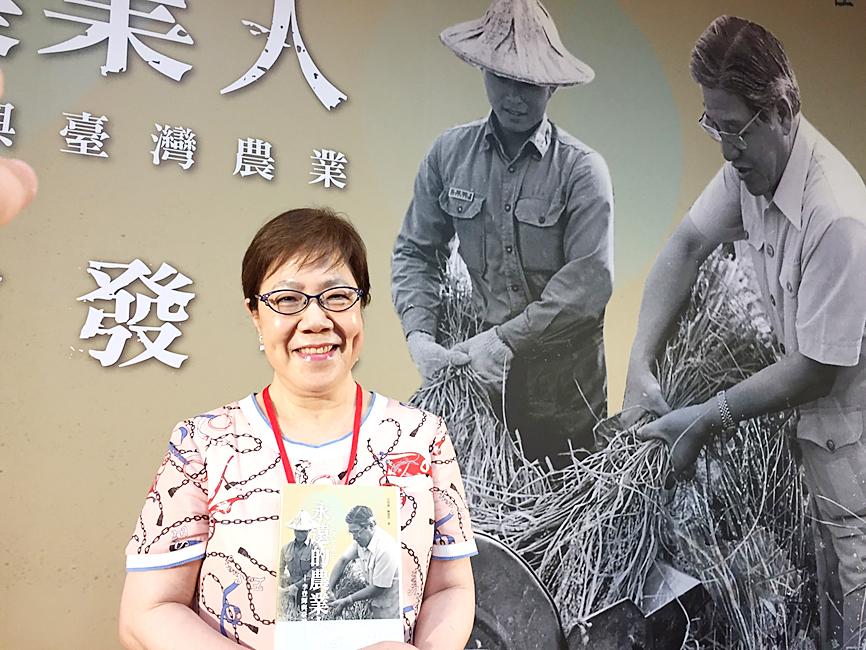Council of Agriculture Minister Chen Chi-chung (陳吉仲) yesterday praised former president Lee Teng-hui’s (李登輝) contributions to the development of Taiwanese agriculture at the launch of Harvest Publications’ new book, Mr Agriculture — Lee Teng-hui (永遠的農業人:李登輝與台灣農業).
The first 50 years of Taiwan’s development are closely related to agriculture, and anyone who wishes to understand it should read the book, Chen said at the launch in Taipei, held on the eve of the second anniversary of Lee’s passing.
Lee’s belief that agriculture was the backbone of the nation is a core value that every agriculture minister cherishes, Chen said, adding that the council, carrying on Lee’s dreams, is pushing for “green agriculture” that would safeguard farmers’ interests while ensuring environmental sustainability.

Photo: CNA
Lee’s policies shed light on why Japanese engineer Yoichi Hatta, known for his contributions to hydraulic engineering in Taiwan, had pushed for the building of the Chianan Irrigation Canal (嘉南大圳), which turned the Chianan Plain (嘉南平原) into the breadbasket of Taiwan, Chen said.
Lee’s devotion to furthering agriculture policies, including farmers’ health insurance and occupational hazard insurance, has deeply affected agricultural policies and are still in effect, he said.
Ikuyo Murashima, head of the Japan-Taiwan Exchange Association’s cultural affairs and public relations department, said Lee introduced to Japan Hatta’s role in the construction of the Chianan Irrigation Canal and its continuing contribution to Taiwanese agriculture.
Taiwanese do not have to thank Japan for such an engineering feat, because Taiwanese themselves took part in its construction, Murashima added.
Taiwanese agriculture is a key factor in building closer relations between Japan and Taiwan, Murashima said, adding that she was confident that the late Lee and former Japanese prime minister Shinzo Abe, who considered Lee a mentor, would be glad to see Taiwan and Japan working together to deepen their friendship.
Separately, the Lee Teng-hui Foundation and Lee’s family yesterday announced that it would donate 2,000 manuscripts of Lee’s speeches and other documents to the Academia Historica.
The Academia Historica is holding a ceremony today to accept the donation.
The documents include valuable manuscripts, such as Lee’s conversation with then-Straits Exchange Foundation chairman Koo Chen-fu (辜振甫) before he visited China in 1998.
Koo’s visit would later be cited as the foundation of the so-called “1992 consensus,” a term that former Mainland Affairs Council chairman Su Chi (蘇起) in 2006 admitted to making up in 2000 — referring to a tacit understanding between the Chinese Nationalist Party (KMT) and the Chinese Communist Party that both sides of the Taiwan Strait acknowledge that there is “one China,” with each side having its interpretation of what “China” means.
Additional reporting by Lee Hsin-fang

Chinese Nationalist Party (KMT) Chairman Eric Chu (朱立倫), spokeswoman Yang Chih-yu (楊智伃) and Legislator Hsieh Lung-chieh (謝龍介) would be summoned by police for questioning for leading an illegal assembly on Thursday evening last week, Minister of the Interior Liu Shyh-fang (劉世芳) said today. The three KMT officials led an assembly outside the Taipei City Prosecutors’ Office, a restricted area where public assembly is not allowed, protesting the questioning of several KMT staff and searches of KMT headquarters and offices in a recall petition forgery case. Chu, Yang and Hsieh are all suspected of contravening the Assembly and Parade Act (集會遊行法) by holding

PRAISE: Japanese visitor Takashi Kubota said the Taiwanese temple architecture images showcased in the AI Art Gallery were the most impressive displays he saw Taiwan does not have an official pavilion at the World Expo in Osaka, Japan, because of its diplomatic predicament, but the government-backed Tech World pavilion is drawing interest with its unique recreations of works by Taiwanese artists. The pavilion features an artificial intelligence (AI)-based art gallery showcasing works of famous Taiwanese artists from the Japanese colonial period using innovative technologies. Among its main simulated displays are Eastern gouache paintings by Chen Chin (陳進), Lin Yu-shan (林玉山) and Kuo Hsueh-hu (郭雪湖), who were the three young Taiwanese painters selected for the East Asian Painting exhibition in 1927. Gouache is a water-based

Taiwan would welcome the return of Honduras as a diplomatic ally if its next president decides to make such a move, Minister of Foreign Affairs Lin Chia-lung (林佳龍) said yesterday. “Of course, we would welcome Honduras if they want to restore diplomatic ties with Taiwan after their elections,” Lin said at a meeting of the legislature’s Foreign Affairs and National Defense Committee, when asked to comment on statements made by two of the three Honduran presidential candidates during the presidential campaign in the Central American country. Taiwan is paying close attention to the region as a whole in the wake of a

OFF-TARGET: More than 30,000 participants were expected to take part in the Games next month, but only 6,550 foreign and 19,400 Taiwanese athletes have registered Taipei city councilors yesterday blasted the organizers of next month’s World Masters Games over sudden timetable and venue changes, which they said have caused thousands of participants to back out of the international sporting event, among other organizational issues. They also cited visa delays and political interference by China as reasons many foreign athletes are requesting refunds for the event, to be held from May 17 to 30. Jointly organized by the Taipei and New Taipei City governments, the games have been rocked by numerous controversies since preparations began in 2020. Taipei City Councilor Lin Yen-feng (林延鳳) said yesterday that new measures by